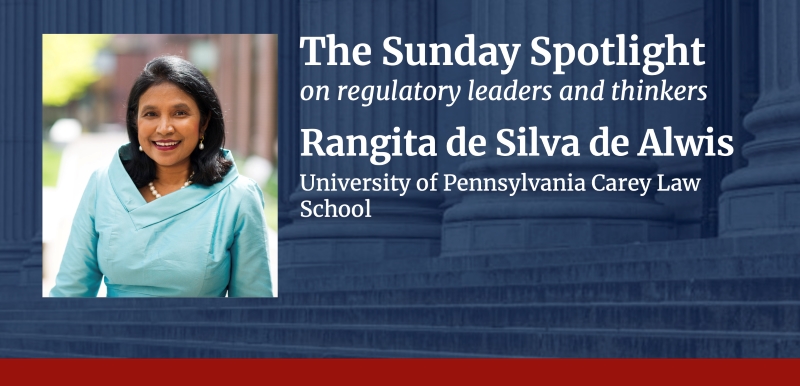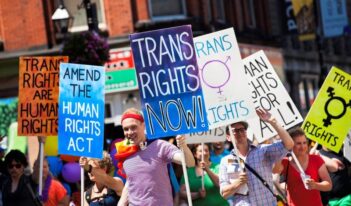
Rangita de Silva de Alwis discusses the state of women in leadership positions around the globe.
In a discussion with The Regulatory Review, globally recognized women’s human rights expert Rangita de Silva de Alwis offers her thoughts on the increasing presence of women in leadership positions around the world.
Women are rising through the ranks of political, corporate, and academic life. According to de Silva de Alwis in a forthcoming article, this increased representation of women in the political decision-making process in Europe has spurred critical legislation safeguarding the rights of women. For example, de Silva de Alwis points out that Spain’s enacted gender quota, which led to a legislative composition of 44 percent women, allowed for the passage of the first paid menstrual leave, expanded abortion rights, and reconceptualized affirmative consent in rape law.
Despite these developments, de Silva de Alwis argues that women remain underrepresented in all levels of political decision making. She writes that, to achieve true gender parity in political life, the policy focus should center on not only the percentage of women leaders but also their achievements once elected. De Silva de Alwis predicts that as over 60 countries enter a major election cycle during the coming year, opportunities will arise for even more women to step into positions of power.
In this Spotlight, de Silva de Alwis—drawing on her illustrious career in international women’s rights advocacy and scholarship—contextualizes this important moment in political change, identifies challenges facing women candidates, and analyzes the actions of the United Nations Convention on the Elimination of Discrimination (CEDAW) that seek to advance gender parity.
De Silva de Alwis is on the faculty of the University of Pennsylvania Carey Law School as well as an expert member on the treaty body to CEDAW and the Women Peace and Security Focal Point Network. She is also the Hillary Rodham Clinton Fellow on Global Gender Equity at Georgetown University’s Institute for Women, Peace and Security. Before entering academia, de Silva de Alwis was the inaugural director of the Global Women’s Leadership Initiative and the Women in Public Service Project launched by former U.S. Secretary of State Hillary Rodham Clinton. She has served as a special advisor to the UN Development Programme, UNICEF, and the UN Population Fund, and most recently served on the UN Secretary General’s Task Force on Poverty Eradication, the American Bar Association’s Commission on Women in the Profession, and the U.K. Parliamentary Inquiry on Gender Apartheid.
The Regulatory Review is pleased to share the following interview with Rangita de Silva de Alwis.
The Regulatory Review: What is the current state of women in politics around the world?
De Silva de Alwis: When looking at scenes from history, such as the Yalta Conference, I notice only men. In the last few decades, however, there seems to be a reawakening for women in public life.
In the 1990s, many women around the world saw Secretary Hillary Clinton as their voice. At the Beijing Women’s World Conference in 1995, she advocated that women’s rights are human rights. In fact, she led the adoption of UN Security Council Resolution 1888 in 2009 that established the office of the Secretary General for Sexual Violence in Conflict.
Recent elections have included historic campaigns of women politicians. Mexico elected its first woman president, Claudia Sheinbaum, a Nobel laureate. As a climate scientist, Sheinbaum pledged an eco-vision for Mexico. Rachel Reeves, the United Kingdom’s first woman Chancellor of the Exchequer, vowed to shrink the gender pay gap. In the United States, Vice President Kamala Harris pledged a “just and lasting” peace in Ukraine and a ceasefire in the Israel–Palestine conflict. If she is elected, and she delivers on her promise, she will be the first woman head of state to lead the negotiations for peace in two of the most intractable modern global conflicts. In August of this year, Thailand appointed one of the youngest women prime ministers in Asia, Paetongtarn Shinawatra, who describes herself as a compassionate capitalist and supporter of Thailand’s new equal marriage law.
This progress for women is not without pushback. For example, in Afghanistan in mid-September, a 114-page set of formal edicts prohibited women’s voice in public. In response, the European Union Parliament adopted a resolution to address the deteriorating situation of Afghan women. As I shared during a recent speech at the historic Palace of Justice in Vienna, women cannot remain silent when Afghan women’s voices are silenced.
TRR: With over 60 countries holding elections this year, what distinctive challenges do women candidates face this election cycle?
De Silva de Alwis: Challenges are many, and they are global. First, women in public life are disproportionately impacted by online violence, disinformation, and AI-driven deepfakes. A recent Inter-Parliamentary Union survey of women legislators worldwide found that 82 percent of the respondents had experienced at least one incident of online gender-based violence, including sexual images were often fake or doctored.
Second, women politicians sometimes face a “glass cliff”: They assume leadership during a period of crisis, as few men would dare do. But as evident in studies of leadership during the COVID-19 pandemic, women leaders have managed crisis with competency and decisiveness.
TRR: To what extent can increasing women in public office help to bring about more effective policies to combat gender violence?
De Silva de Alwis: Critical mass is a term borrowed from nuclear physics that refers to the smallest amount of fissile material needed for a sustained nuclear chain reaction. For women leaders to have impact, a critical mass of women is not enough. Gender parity is needed in the 21st century.
In addition, my recent work examines not just “descriptive” or symbolic representation but also “substantive” representation. “Descriptive” representation refers to the number of elected representatives in a governing body from underrepresented groups. No doubt that it is important for women and women of intersectional identity to “see” themselves represented. But “substantive” representation is a far greater measure of what women do once elected or appointed to a leadership position. Do they represent the needs and concerns that arise from women’s differential experience? And will these concerns be addressed through policies and legislation in a climate dominated by men?
TRR: As a member of CEDAW, you have been involved in drafting General Recommendation 40—or GR 40. What is this draft recommendation and how would it support gender parity throughout society?
De Silva de Alwis: Building on the Beijing Platform of Action, GR 40 redefines “equal and inclusive representation” from a gender quota to parity between women and men in terms of both equal access to and equal power within decision-making systems. This definition also accounts for diversity among women along the lines of race, ethnicity, religion, disability, age, class, caste, sexual orientation, and gender identity, among other characteristics. GR 40 also confronts some of the key challenges of the 21st century, including artificial intelligence, climate change, and the changing nature of warfare. My friend and colleague Nicole Ameline was vital in drafting the GR by bringing her own experience as France’s Minister of Parity and the architect of the gender parity provision in France’ s constitution.
One particular paragraph of GR 40 is notable because, for the first time, the concept of gender apartheid is referenced as part of an international normative structure. The draft specifically acknowledges that the most extreme forms of patriarchy are “tantamount to a form of apartheid based on gender segregation.” Until now, the concept of gender apartheid had yet to enter the lexicon of the law. To bridge the gap, GR 40 offers several examples to illustrate how centering women and correcting their erasure from international law is essential to the pursuit of justice.
As I listen to a growing chorus of voices advocating for the recognition and dismantling of gender apartheid, I am reminded of the late Judge Mohamed Shahabuddeen of the International Criminal Tribunal for Yugoslav, who stated that anything short of addressing full accountability risks minimizing their severity.



